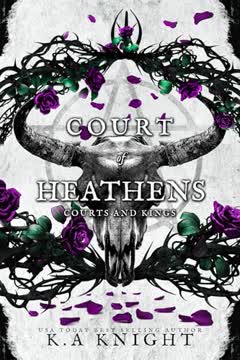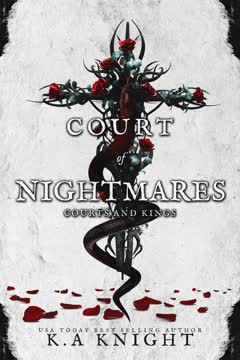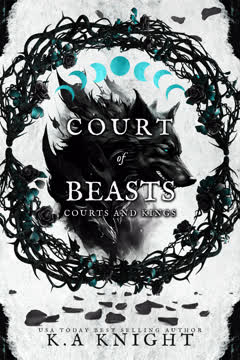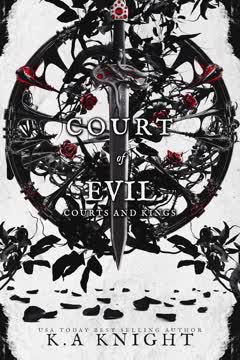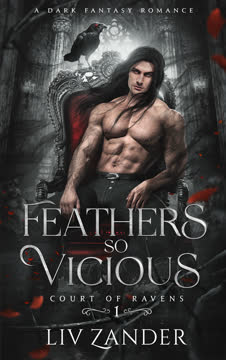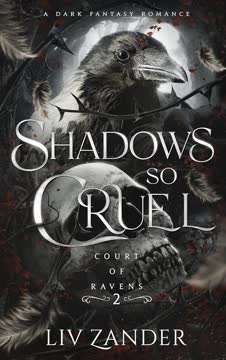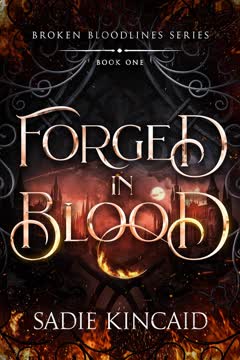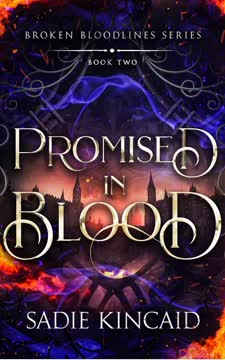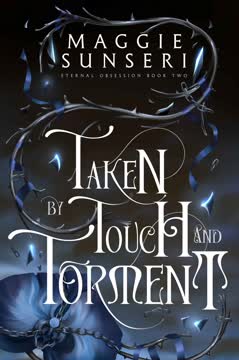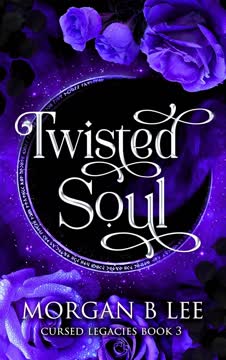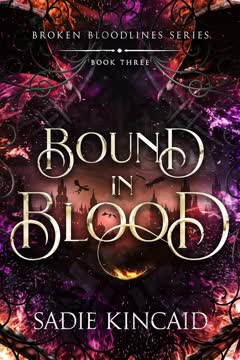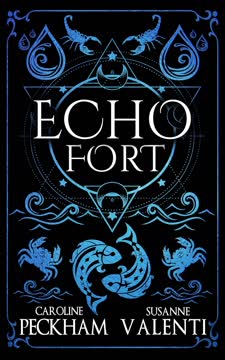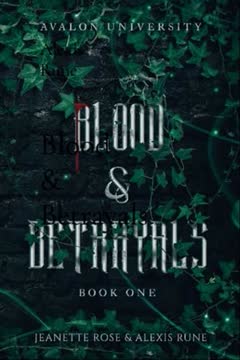Plot Summary
Witch's Lonely Bargain
Freya, an outcast witch, is plagued by a demon only she can see. Isolated within her coven, she's both feared and needed for her unique, dark magic. Her only constant companion is the demon, whose taunts and temptations both comfort and torment her. When her magic threatens to spiral out of control, Freya's desperation leads her to attempt a powerful spell, hoping to rid herself of the demon's influence. Instead, she inadvertently summons a god, Phrixius, setting in motion a chain of events that will force her to confront the darkness within herself and the true nature of her power. The chapter establishes Freya's loneliness, her struggle for acceptance, and the dangerous allure of the forbidden.
Demon's Tempting Shadows
The demon, bound to Freya since childhood, is both her tormentor and her secret desire. He delights in pushing her boundaries, blurring the line between protection and predation. Their relationship is a twisted dance of power, temptation, and reluctant affection. The demon's presence isolates Freya further from her coven, but also becomes her only source of intimacy and understanding. As he teases her with glimpses of pleasure and danger, Freya's resistance begins to falter, hinting at a deeper connection and a shared fate. The demon's obsession with Freya grows, and his true feelings—masked by mischief—begin to surface, complicating their already fraught bond.
God Summoned, Fate Unraveled
Freya's attempt to banish her demon backfires, summoning Phrixius, the god of magic and moon. Phrixius is drawn to Freya's raw, chaotic power and the darkness lurking within her. The three—witch, demon, and god—form a volatile triangle, each with their own motives and secrets. Phrixius is both fascinated and alarmed by Freya's potential, sensing a threat that could upend the balance of magic. The demon, threatened by the god's presence, becomes more possessive. Freya, caught between two supernatural forces, must navigate their competing influences while struggling to maintain control over herself and her destiny.
Market of Monsters
In the bustling supernatural market, Freya finds rare moments of acceptance among other outcasts and magical beings. Here, she is not judged for her darkness, and the demon's antics are less out of place. The market is a microcosm of the world's hidden magic, filled with danger, desire, and opportunity. Freya's interactions with other creatures—trolls, fae, gargoyles—reveal her curiosity and hunger for connection, as well as her willingness to embrace the monstrous within herself. The demon's jealousy and Phrixius's watchful gaze follow her, each vying for her attention and loyalty.
Night of Forbidden Desires
Freya's loneliness and the demon's relentless seduction culminate in a night of forbidden pleasure. She seeks out monstrous lovers, both to assert her independence and to provoke the demon. Their voyeuristic, boundary-pushing encounters blur the lines between pleasure and power, love and possession. The demon's hunger for Freya becomes undeniable, and Phrixius's concern deepens as he witnesses the intensity of their bond. Freya's willingness to embrace her desires—and the darkness that comes with them—marks a turning point, foreshadowing the unleashing of even greater powers.
Summoning Gone Wrong
Freya's attempt to trap the demon with Phrixius's help goes catastrophically wrong. Instead of banishing her tormentor, she opens a gateway to something far older and more dangerous—a primordial creature of death and shadow. The coven's protective barriers are breached, and the balance of magic is threatened. Phrixius recognizes the gravity of the situation, while the demon is both terrified and fascinated by the unleashed force. Freya is forced to confront the consequences of her actions, realizing that her power is both a gift and a curse, and that she may be the only one capable of stopping what she has set free.
Three's a Dangerous Company
With the god now a reluctant houseguest and the demon ever-present, Freya's home becomes a crucible of conflicting desires and loyalties. The trio's interactions are fraught with sexual tension, rivalry, and moments of unexpected tenderness. Phrixius and the demon are forced to cooperate, each revealing vulnerabilities and hidden motives. Freya, caught between them, begins to understand the true nature of her power and the depth of her own desires. The boundaries between love, obsession, and duty blur, setting the stage for greater sacrifices and betrayals.
Mask of Origins Stolen
The theft of the Mask of Origins—a powerful, evil relic—shakes the coven and exposes deep-seated fears about necromancy and forbidden magic. Freya becomes a prime suspect, her reputation as a dark witch making her an easy target. Agatha, the coven leader, confronts Freya, forcing her to defend herself and question her place among her own people. The demon and Phrixius rally to her side, but the coven's suspicion and the mask's disappearance foreshadow a greater threat. The mask's power calls to Freya, hinting at a connection between her and the ancient evil it represents.
Death Magic Awakens
The stolen mask is used to channel death magic, raising an army of the dead and signaling the return of necromancy. Freya's latent powers begin to manifest uncontrollably, drawing the attention of both allies and enemies. The demon reveals the truth about her heritage—she is a necromancer, a being feared and hunted for centuries. The coven's fear turns to open hostility, and Freya is forced to choose between hiding her true self or embracing her destiny. The demon and Phrixius pledge their loyalty, but the cost of their alliance grows as the threat of the necromancer army looms.
Necromancer's True Nature
Under pressure from the coven and the escalating crisis, Freya's necromantic powers are fully exposed. She is forced to confront the darkness within herself and the legacy of her kind. The demon confesses the origins of their bond—a deal made with Freya's dying mother to protect her at all costs. Phrixius, torn between duty and love, must decide whether to uphold the gods' laws or defend Freya. The trio's relationship is tested as Freya grapples with guilt, fear, and the temptation to surrender to her power. The stage is set for a confrontation with the true enemy: the necromancer who seeks to claim Freya as his heir.
Coven's Judgment, Witch's Truth
The coven, terrified of Freya's power, debates her fate. Agatha's conflicted loyalty is revealed, and Freya is forced to defend herself against accusations and magical attacks. The demon and Phrixius stand as her only protectors, but even they cannot shield her from the pain of rejection. Freya's sense of self fractures as she is forced to choose between her found family and her birthright. The coven's betrayal cements her transformation from outcast to adversary, and she resolves to forge her own path, regardless of the cost.
Darkness Unleashed Within
In a desperate bid to save her loved ones and stop the necromancer's army, Freya unleashes the full force of her necromancy. The act is both triumphant and tragic, as she sacrifices her innocence and risks losing herself to the darkness. The demon and Phrixius absorb some of her power, helping her maintain control, but the experience leaves all three changed. Freya's victory is pyrrhic—she saves the coven but becomes the very thing they feared. The necromancer's plan is revealed: he wanted Freya to embrace her darkness, ensuring the rise of a new queen of death.
Love, Loss, and Loyalty
The gods intervene, fearing Freya's power. In a devastating confrontation, Sha and Adder are banished, and Phrixius is forced to choose between his love for Freya and his duty as a god. Freya, broken by loss and betrayal, is pushed to the brink. In a final act of love, she sacrifices herself to save Phrixius and prevent the gods from destroying everything she holds dear. Her death is both an ending and a beginning, as her soul lingers, refusing to be forgotten.
The Monster's Heart Revealed
Phrixius, Adder, and Sha, shattered by Freya's death, embark on a perilous quest to reclaim her soul from the Pool of Souls. Each must sacrifice a part of themselves—godhood, demonic essence, monstrous strength—to bring her back. Guided by love and desperation, they defy the laws of life and death, aided by the fallen god Luellen. Their journey is a testament to the power of love, loyalty, and the willingness to embrace darkness for the sake of light.
The Army of the Dead
Freya is reborn, more powerful and self-aware than ever. Together with her men, she confronts the necromancer and his army in a climactic battle that tests the limits of her power and her humanity. The gods, fearful of what she has become, demand her death, but Freya and her allies refuse to submit. In a display of ultimate power and sacrifice, Freya destroys the necromancer, liberates the trapped souls, and forces the gods to confront their own hypocrisy and fear.
Sacrifice and Surrender
Freya's victory comes at a steep price—her own life. In a final act of agency, she chooses to die on her own terms, breaking the cycle of violence and vengeance. Her sacrifice inspires change among the gods and the magical community, opening the door for a new era of understanding and acceptance. Phrixius, Adder, and Sha, devastated but determined, refuse to let her go, risking everything to bring her back once more.
The Fall of Innocence
Freya is resurrected through the combined sacrifice of her lovers, each forever changed by the ordeal. Together, they build a new home—a court for outcasts, monsters, and those who refuse to hide in the shadows. The coven, once fearful, offers a tentative blessing, and the gods, led by Mors, agree to a fragile peace. Freya's journey from outcast to queen of heathens is complete, and she embraces her power, her darkness, and her love without shame.
Death, Rebirth, and Reckoning
In the aftermath, Freya and her chosen family create a sanctuary for all who have been hunted, feared, or misunderstood. Their home becomes a beacon of hope and defiance, a place where monsters and mortals alike can find acceptance. The story ends not with a final victory, but with the promise of new beginnings, hard-won peace, and the enduring power of love to transform even the darkest fate.
Characters
Freya
Freya is a powerful but ostracized witch, marked by her affinity for dark magic and her lifelong bond with a demon. Orphaned and isolated, she craves acceptance but is forced to confront the darkness within herself. Her journey is one of self-discovery, as she moves from denial and fear to acceptance and mastery of her necromantic powers. Freya's relationships—with the demon, Phrixius, and her coven—are fraught with longing, betrayal, and hard-won trust. Her greatest strength is her capacity for love and sacrifice, which ultimately allows her to break the cycle of violence and forge a new destiny for herself and others like her.
The Demon (Adder)
The demon, later revealed as Adder, is both Freya's curse and her salvation. Bound to her by a deal made with her dying mother, he is at once her shadow, her seducer, and her fiercest defender. His love for Freya is obsessive, possessive, and ultimately redemptive. Adder's journey mirrors Freya's—he moves from playful cruelty and selfishness to vulnerability and self-sacrifice. His willingness to give up everything for Freya, including his own demonic essence, is a testament to the transformative power of love, even for the most monstrous.
Phrixius
Phrixius is the embodiment of order, duty, and restraint, yet he is drawn to Freya's chaos and passion. Initially summoned by accident, he becomes both a mentor and a rival, torn between his divine responsibilities and his growing love for Freya. Phrixius's struggle is one of identity—can he remain true to his principles while embracing the forbidden? His ultimate choice to forsake godhood for Freya is both tragic and triumphant, marking his transformation from distant deity to devoted partner.
Sha (The Creature)
Sha is the physical manifestation of the ancient evil Freya accidentally unleashes. Though monstrous in form, he is childlike in his devotion to Freya, eager to please and desperate for acceptance. Sha's journey is one of self-actualization, as he learns to balance his destructive instincts with the love and loyalty he feels for Freya and her chosen family. His presence forces Freya to confront the parts of herself she fears most, and his unwavering support is crucial to her ultimate victory.
Agatha
Agatha is the leader of Freya's coven, embodying both the nurturing and judgmental aspects of community. She is torn between her duty to protect her people and her affection for Freya, whom she both fears and loves. Agatha's actions—ranging from harsh discipline to secret protection—reflect the complexities of leadership and the dangers of fear-driven decision-making. Her eventual acceptance of Freya's true nature is a small but significant step toward reconciliation and change.
The Necromancer (William Great)
The necromancer is both Freya's enemy and her dark reflection. Driven by grief and a desire for vengeance after the loss of his family, he seeks to remake the world in his own image, regardless of the cost. His manipulation of Freya is both a test and a trap, designed to force her to embrace her power and continue his legacy. Ultimately, his willingness to die for his ideals is both his downfall and his final, twisted gift to Freya.
Mors
Mors is the enigmatic god of death, feared by all but motivated by a complex sense of duty and compassion. He serves as both a warning and a guide, helping Freya and her allies navigate the boundaries between life and death. Mors's willingness to bend the rules for love and justice marks him as a rare ally among the gods, and his actions are instrumental in Freya's resurrection and the forging of a new peace.
Agatha's Coven
The coven represents the broader magical society—fearful of difference, quick to judge, but capable of growth. Their treatment of Freya is a microcosm of the world's struggle with otherness and the unknown. Individual members range from supportive to hostile, and their eventual acceptance of Freya's leadership signals a shift toward a more inclusive future.
Luellen (Fallen God)
Luellen is the original fallen god, whose own tragic love story parallels Freya's. His guidance in the Pool of Souls is crucial to Freya's return, and his presence serves as a reminder that even the most powerful beings are shaped by love, loss, and the choices they make.
Mask of Origins
The Mask of Origins is both a literal and metaphorical vessel for the sins of the past. Its theft and misuse trigger the events that force Freya to confront her heritage and the legacy of necromancy. The mask's power to channel and amplify death magic makes it a focal point for the story's central conflict.
Plot Devices
Triangular Power Dynamic
The narrative is driven by the shifting alliances, rivalries, and desires among Freya, Adder, and Phrixius. Their interactions explore themes of temptation, loyalty, and the struggle between order and chaos. The triangle is both a source of tension and a crucible for transformation, forcing each character to confront their deepest fears and desires.
Forbidden Magic and Identity
Freya's journey is shaped by her struggle to accept her true nature in a world that fears and hunts her kind. The revelation of her necromantic heritage, and the coven's reaction, serve as a commentary on prejudice, self-acceptance, and the dangers of suppressing one's identity. The story uses necromancy as a lens to explore the costs and consequences of denying or embracing one's power.
Sacrifice and Resurrection
The plot repeatedly employs sacrifice—of innocence, love, and even life itself—as a means of achieving growth and change. Freya's death and resurrection, enabled by the combined sacrifices of her lovers, underscore the story's central message: true power lies in the willingness to give up everything for those you love. The Pool of Souls serves as both a literal and symbolic site of rebirth, where old wounds are healed and new bonds are forged.
Army of the Dead and Mask of Origins
The necromancer's army and the cursed mask are not just obstacles to be overcome—they are manifestations of the characters' internal battles with fear, grief, and the temptation to surrender to darkness. The final confrontation is as much about defeating the enemy as it is about mastering oneself.
Gods as Flawed Authorities
The gods, far from being omniscient or benevolent, are depicted as fallible, fearful, and bound by their own laws. Their intervention raises the stakes and forces the characters to question the legitimacy of authority, the meaning of justice, and the possibility of change. Mors and Luellen, as exceptions, highlight the potential for compassion and rebellion even among the most powerful.
Foreshadowing and Cyclical Structure
The narrative is rich with foreshadowing—visions, dreams, and repeated motifs (the mask, the pool, the tree)—that link the characters' present struggles to the traumas of the past and the possibilities of the future. The story's cyclical structure, with themes of death and rebirth, underscores the idea that history can be rewritten, but only through conscious choice and sacrifice.
Analysis
Court of Heathens is a dark, sensual, and emotionally charged exploration of power, identity, and the redemptive potential of love. At its core, the novel interrogates what it means to be "other"—to be feared, hunted, and forced to choose between self-denial and self-acceptance. Freya's journey from outcast witch to queen of monsters is both a personal and political transformation, challenging the structures of authority (the coven, the gods) that perpetuate cycles of violence and exclusion. The story's explicit content and monstrous romance are not mere titillation, but vehicles for exploring the boundaries of desire, agency, and the willingness to embrace all parts of oneself, even the darkest. The relationships between Freya, Adder, Phrixius, and Sha are complex, blending love, obsession, and mutual salvation. The novel's use of necromancy as a metaphor for otherness, and its insistence that evil is not innate but created by fear and trauma, offer a powerful critique of prejudice and the dangers of unchecked authority. Ultimately, Court of Heathens is a story about forging family and home in the ruins of the old world, and about the courage it takes to claim joy, love, and power on your own terms.
Last updated:
Review Summary
Court of Heathens received mostly positive reviews, with readers praising the witty banter, steamy romance, and engaging characters. Many enjoyed the unique monster romance elements and the development of relationships between the protagonist and her harem. The book's dark themes and spicy scenes were highlighted as strengths. Some readers found the plot confusing or felt it lacked originality, but overall, fans of paranormal reverse harem romances were satisfied with this installment in the Courts & Kings series.
